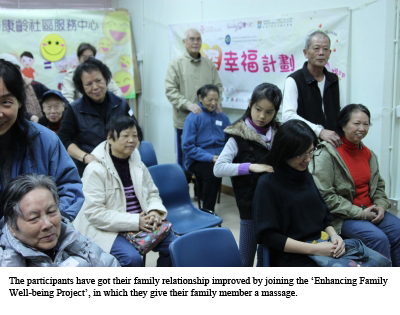FAMILY: A Jockey Club Initiative for a Harmonious Society Cohort Study Result Announcement - Social Barometer: Poverty & Disparities on Health, Happiness & Harmony
The effect of poverty and income inequality on the health of low income families could worsen if these fundamental issues and the related concern of health care access are not closely monitored and addressed, according to academics working on the FAMILY Project, a major territory-wide study on health, happiness and harmony in Hong Kong families.
The FAMILY Project is funded by The Hong Kong Jockey Club Charities Trust and initiated in collaboration with the School of Public Health of the University of Hong Kong (HKU). Researchers interviewed 20,481 individuals of 8,355 households for the study between March 2009 and March 2011 with the aim of understanding the ?3Hs?: health, happiness and harmony in the family setting.
The study found household income level having a positive effect on all indicators of the 3Hs: the higher the household income, the higher the scores in health, happiness and harmony. On the other hand, health care services are least accessible to low income families, who are most in need, confirming the ?Inverse Care Law?.
Family harmony was identified in the study as a buffer against poverty?s adverse effect on mental health, where more harmonious families reported better well-being the entire income spectrum. Among less harmonious families, a lower household income was associated with poorer mental health.
Analysis of the Gini Coefficient estimated at the Tertiary Planning Unit (TPU) level found no immediately apparent impact of income inequality on the 3Hs as if yet.
?Factors such as universal health coverage, a well-developed public transport network linking different districts and free education may have so far mitigated against the adverse impact of income disparities. However, as the adverse impact of intergenerational disparities may take time to become apparent, we must collectively adopt a precautionary approach to strengthen support to low income families,? said Prof Gabriel Leung, Head of HKU?s Department of Community Medicine.
Prof Leung said more attention should focus on the plight of those who ?subdivided flats?: ?The existing sampling frame, based on the Register of Quarters, adopted in mass population studies including the Census does not adequately cover these living in subdivided flats, especially when situated in commercial or industrial zones, whereas these households are the very ones in most need of social support.?
Prof Lam Tai-hing, Principal Investigator of the FAMILY Project said: ?Strengthening intergenerational family relationships and enhancing harmony can be effective buffers against the adverse effect of poverty on family health. The ?Enhancing Family Well-being Project? and ?Boosting Positive Energy Programme? of the FAMILY Project are organised with the aim of increasing resilience and enhancing positive family relationships.?
FAMILY Project
The FAMILY Project is funded by The Hong Kong Jockey Club Charities Trust and initiated in collaboration with the School of Public Health of HKU. Researchers interviewed 20,481 individuals of 8,355 households for the study with a view to identifying the source of family problems, devising suitable preventive measures and promoting family Health, Happiness and Harmony (3Hs) through a territory-wide households survey, intervention projects and public education. For details, please refer to the project website www.family.org.hk.












.png)
